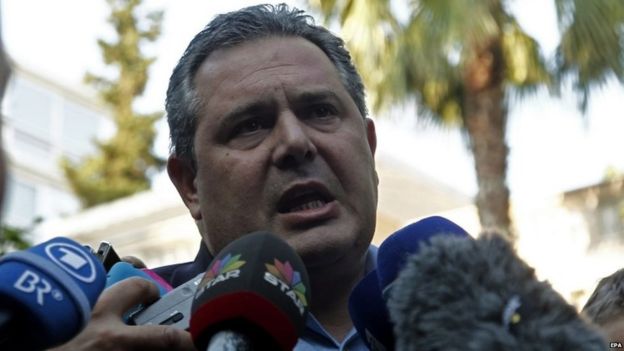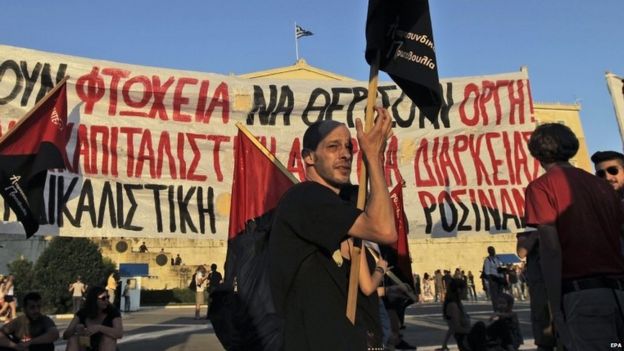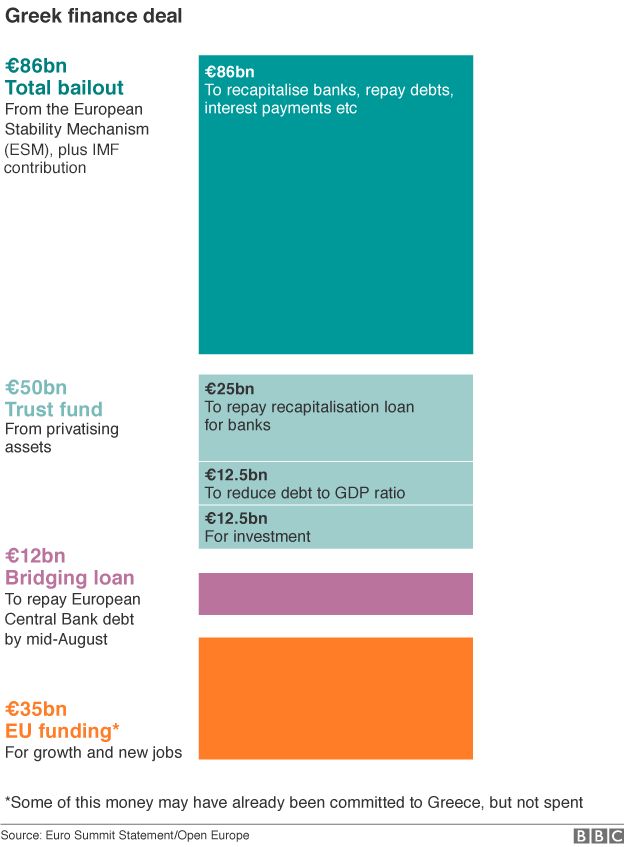Greek Prime Minister Alexis Tsipras is facing a tough battle to win support from coalition partners for the third bailout offered by eurozone leaders.
Four pieces of legislation must be passed by the end of Wednesday including pension and VAT reforms.
But Defence Minister Panos Kammenos, a junior coalition partner, has already said he will not support the measures.
If the deal fails, Greece’s banks face collapse and the country could then be forced to leave the euro.
The bailout is conditional on Greece passing all the agreed reforms – including raising tax revenue and liberalising the labour market – in parliament by Wednesday.
Finance ministers from all 28 EU countries are holding a scheduled meeting in Brussels on Tuesday morning, where they will discuss the situation in Greece.

Defence Minister Panos Kammenos likened the situation to a ‘coup’ by foreign leaders

There were demonstrations at the Greek Parliament while unions threatened to strike
Following about 17 hours of summit talks in Brussels an EU statement on Monday spoke of up to €86bn (£61bn) of financing for Greece over three years.
Although it included an offer to reschedule Greek debt repayments “if necessary”, there was no provision for the reduction in Greek debt – or so-called “haircut” – that the Greek government had sought.
Parliaments in several eurozone states also have to approve any new bailout.
Cabinet reshuffle expected
As Mr Tsipras returned to Greece on Monday, anti-austerity demonstrations took place and civil servants called for a 24-hour strike on Wednesday.
Many Greeks and others believing unduly harsh terms are being imposed have expressed their widespread anger online using the hashtag #ThisIsACoup.
Defence Minister Panos Kammenos, whose Independent Greeks party underpins Mr Tspiras’s coalition government, likened the situation to a “coup”.
He said he would not support the agreement – although he wants to remain in government.
The BBC’s Mark Lowen in Athens understands the prime minister is expected to reshuffle his cabinet and possibly form a new unity government later this week.
Mr Tsipras came to power after his left-wing Syriza party won elections in January on a promise to end austerity. Greece has already received two bailouts totalling €240bn since 2010.
Greek banks have been closed for two weeks, with withdrawals at cash machines limited to €60 per day, and will remain closed until after Wednesday.
Analysis: Mark Lowen, BBC News, Athens
With the deal done, Greece is now racing to meet its first deadline: to pass four pieces of legislation by the end of Wednesday.
But the cracks are emerging in Alexis Tsipras’s coalition. It doesn’t bode well and the prime minister is expected to reshuffle his cabinet.
Away from parliament, Mr Tsipras will also struggle to sell this deal to his own voters, with strike action already called. But only if he pushes on will the Greek banks get an urgent injection of cash and will the vital bailout funds start flowing once again.

BBC
 Q FM Africa's Modern Radio
Q FM Africa's Modern Radio